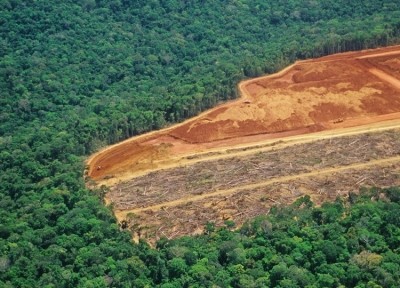The European Deforestation Regulation (EUDR) is coming into force in just a few months. From 30 December 2024, business operators in the EU will be required, by law, to prove products containing specific commodities are deforestation-free.
These include soy, beef, palm oil, wood, coffee and rubber.
The new law is elaborate, and industry is still getting to grips with its complexities. But time is running out. For those concerned about compliance, we’ve rounded up some of the lesser-known ways the incoming regulation could impact food and drink operators and their supply chains.
1. EUDR is not only about deforestation
EUDR is often referred to as the deforestation regulation, but this can be misleading. Yes, the law covers deforestation, but its scope is actually much wider. It would be better off being referred to as the due diligence regulation, since that’s what it demands of operators in the EU.
 EUDR is about deforestation, but not just. GettyImages/luoman
EUDR is about deforestation, but not just. GettyImages/luoman
Businesses will be required to issue a due diligence statement establishing there is negligible risk of deforestation having occurred in its supply chain since December 2020.
But operators will also have to prove the product was grown legally according to land of production. That means in accordance with local land rights, human rights, labour rights, and protection of indigenous people, explained Nicko Debenham, managing director of consultancy Sustainability Solutions at IFE in London last month. “They call it EUDR, but it’s actually a lot more than EUDR.”
2. It will massively change how you do business
Complying with EUDR asks a lot from operators, and those looking to adhere will be feeling it. To put it in perspective, whenever an EU-based operator ships any of the relevant products across the customs border, they’ll need to issue a due diligence statement proving compliance for every single farm plot that contributed to the shipment.
For example, a 250-tonne shipment of cocoa coming in from West Africa could be attributed to as many as 4,000 farmers. If each farmer cultivates cocoa on two plots of land, operators would be required to provide the geolocation or polygon map for 8,000 farm plots, explained Debenham.
“That’s the enormity of this seismic change…It’s a complete change in the way you do business. It’s making it very difficult to be a trader and moving business to being cost-plus, transparent, and traceable.”
3. EUDR could negatively impact coffee and cocoa pricing
Perhaps more than other commodities on the EUDR hitlist, coffee and cocoa have the potential to be negatively impacted by the regulation – particularly concerning price. The reason? A high proportion of cocoa (around 60%) and coffee (around 25%) crosses an EU border, compared to closer to 10% or less for the other commodities.
Because so much coffee and cocoa passes into the EU (and not necessarily to be consumed within the bloc), non-compliant shipments will need to find other markets. “If you’re not compliant, you’re probably going to be trading a significant discount, because then you can only sell to Asia or the US,” said Debenham at
 EUDR could impact the price of coffee and cocoa. GettyImages/Eliot76
EUDR could impact the price of coffee and cocoa. GettyImages/Eliot76
IFE, stressing this was his opinion only.
For coffee, this could mean around 40% is forced to sell at a discount, which the sustainability expert predicts will be one of the key challenges facing the market.
4. If you don’t comply, watch out!
What happens if food and beverage operators – or any operators working in those seven commodities – fail to comply?
Firstly, it’s important to note that operators are not innocent until proven guilty. The burden of proof is flipped: operators are required to prove their innocence.
If an operator is found guilty, it will lose the entire affected parcel. Even if just a small percentage is associated with deforestation or was not produced in accordance with local land rights, the full 100% will be confiscated. Operators could also be fined up to 4% of their annual turnover in Europe.
“The implications of not abiding by this regulation are enormous.”
5. It’s expected the UK will implement something similar, but not identical
EUDR is coming into play before the UK’s version, known as the Forest Risk Commodities regulations. They’re not strictly the same: the UK is looking to incorporate maize into the commodities list, for example, which the EU has not.
But they won’t be so different that complying with EUDR won’t help operators adhere to UK law down the track. “Starting to act on EUDR is not going to be contradictory to what you’re going to have to do for the UK regulation moving forward,” Fiorella Sanchez, global EUDR lead at KPMG told food and beverage businesses at IFE.
As to when the UK will enforce its version of a due diligence law is not yet known, but regulatory experts expect lessons learnt in the EU will help inform UK law. A ‘lack of parliamentary time’ will likely mean it will be ‘kicked back and kicked back’, believes Rebecca Kaya, senior regulatory affairs advisory at consultancy Ashbury.
“So while I don’t urge complacency, I would also say let’s wait and see. Do keep abreast of it, but there’s going to be a bit of a delay in the UK.”
6. Time is running out…and it’s likely already too late
Adherence takes time and the clock is ticking. Collecting the relevant data, even digitally, can be arduous, and some in the industry fear operators won’t make it by the 30 December deadline.
Some may be under the ‘illusion’ they’ve got lots off time, but they haven’t, warned Sustainability Solutions’ Debenham. Yes, the law will be enforced late December, but the crops are grown before then – in August, September, and October.
“So you’ve got until August, September, and October to get all your data collected, all your risk assessment done, all your risk mitigation down, and your traceability systems in place.
 EUDR covers soy, palm oil, wood, coffee, rubber, and beef. GettyImages/edsongrandisoli
EUDR covers soy, palm oil, wood, coffee, rubber, and beef. GettyImages/edsongrandisoli
“We’re kind of probably already too late.”
7. Enforcement authorities may not be ready by 30 December 2024
Should businesses that fail to comply be preparing to take a financial hit from 31 December?
It’s very hard to say. Firstly, there are rumours the regulation deadline could be postponed, although the European Commission recently told us the 30 December deadline would remain in place.
Secondly, it may be that if the deadline goes ahead, the national competent authorities (NCAs) – in this case, the Member States – won’t be ready in time.
Acknowledging he was crystal ball gazing only, Sustainability Solutions’ Debenham said he suspects this will be the case. Under this scenario, it could be that operators are granted one more year to comply.
Although impossible to predict the future, the sustainability expert said he could imagine a situation where NGOs then criticise NCAs (rather than operators) for failing to clamp down on deforestation, which could result in some retrospective fines for business.
Whatever the scenario, the strong message to food and business operators in the EU is to act, and act now: “Don’t relax”.
>>> Read full article>>>
Copyright for syndicated content belongs to the linked Source : FoodNavigator – https://www.foodnavigator.com/Article/2024/04/29/eudr-what-food-and-beverage-operators-need-to-know?utm_source=RSS_Feed&utm_medium=RSS&utm_campaign=RSS










